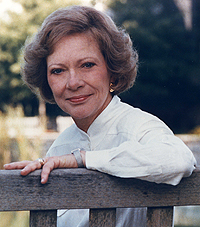SPRING 2009 CONTENTS
Home
The demonization of immunization
Shots get the once-over
What is a vaccine?
Immunization demystified
Asking How
Vaccine Side Effects Probed
When science gets hijacked
NBC News chief medical editor tells why she broke her silence
Insourced to India
A vaccine for a scourge of the developing world
Peet’s passion
The medical education of Amanda Peet
Field yields
Can genetically engineered plants provide vaccines?
Shoot it, donít smoke it
An injectable tobacco-grown vaccine
Golden needles
Vaccines for seniors
Grow up
Can vaccines built for kids work in older immune systems too?

a letter from rosalynn carter
Thank you, Dean Pizzo, for giving me
the
opportunity to welcome readers
to
this special Stanford Medicine report on vaccines.
Rick Diamond/The Carter Center

This issue devotes important attention to immunization at a time when this fundamental preventive health measure is facing skepticism among a growing portion of the public. Yet I believe that when people have the facts, persistent myths diminish. The facts are clear. Vaccines are one of society’s greatest public health achievements. And, it is critical that our nation continues to appreciate the power of vaccines to save lives.
I have been deeply involved in efforts to expand access to vaccines for many years. As the nation’s first lady, I helped initiate and pass state laws requiring immunization documentation for school enrollment, working with Betty Bumpers, the wife of Arkansas Sen. Dale Bumpers. Years later, after a measles outbreak that took the lives of nearly 120 people, Betty and I founded Every Child By Two, a nonprofit group that aims to protect all children from vaccine-preventable diseases.
Vaccination’s track record is astounding. In 1982, vaccines protected American children from seven highly infectious diseases. Today, vaccines protect children from 16. Widespread measles vaccination has resulted in a drop of measles incidence from 894,134 cases in 1941 to 44 cases in 2002. Yet sadly in 2008, there was a disturbing turnaround: 135 people were infected with measles during one of the largest outbreaks in over a decade. Two-thirds of the infected had purposely not been vaccinated, often due to fears about the vaccine.
Clearly the successes of vaccines have been double-edged. A steep drop in infectious illnesses has been a resounding public health victory. Yet the very success of immunization has made many parents complacent about the dangers posed by childhood illnesses. Public health gains are now taken for granted.
Sadly, much of the success to date may be in jeopardy now due to a small but vocal faction that has placed doubt in the minds of the public. Falsehoods about the dangers of vaccines pervade the media as well as the Internet. Despite overwhelming global scientific evidence to the contrary, myths persist that childhood vaccines can cause autism.
I want parents to be reassured by knowing the truth and realizing that there is no conspiracy here. The medical, research and public health communities are united: The Institute of Medicine, the American Academy of Pediatrics, the American Medical Association, the World Health Organization, the National Institutes of Health, the Food and Drug Administration, the Centers for Disease Control and Prevention, and the Department of Health and Human Services all strongly support vaccination.
This issue of Stanford Medicine is a treasure trove of articles about vaccines, research and immunization efforts here and around the globe. You’ll read about new research findings on how the immune system works, a project in India to create a vaccine for a disease that globally today kills one child per minute, along with a Q&A with our public service campaign spokesperson, the actress Amanda Peet, talking about her decision to vaccinate her baby girl.
We’ve come so far in eradicating deadly disease, and we have real hope for further advances. So I’m asking you to spread the word: Vaccines save lives. Take the time to review the Web site www.vaccinateyourbaby.org and share the link with your family and friends. Tell them the facts are clear.
Sincerely,
Rosalynn Carter
President and Co-Founder, Every Child By Two

